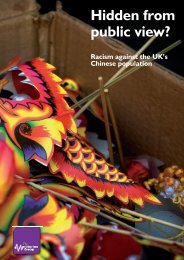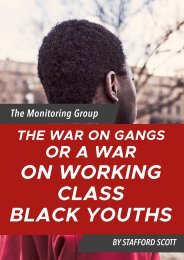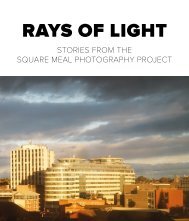Coming of Age : 1976 and the Road to Anti-Racism
Coming of Age : 1976 and the Road to Anti-Racism by Jagdish Patel and Suresh Grover
Coming of Age : 1976 and the Road to Anti-Racism
by Jagdish Patel and Suresh Grover
You also want an ePaper? Increase the reach of your titles
YUMPU automatically turns print PDFs into web optimized ePapers that Google loves.
<strong>the</strong> first weeks <strong>of</strong> <strong>the</strong> trials — before <strong>the</strong> community could alert public opinion <strong>and</strong> <strong>the</strong> conviction rate<br />
was brought down <strong>to</strong> 50 per cent. The SPG <strong>of</strong>ficer who had bludgeoned BIair Peach <strong>to</strong> death remained unidentified<br />
<strong>and</strong> untried. The (Tory) government refused <strong>to</strong> hold an inquiry. The Home Secretary tut-tutted<br />
<strong>the</strong> SPG <strong>and</strong>, despite a massive public outcry against <strong>the</strong> unit (in which even <strong>the</strong> media was caught up), let it<br />
go back <strong>to</strong> its former devices. The Metropolitan Police Commissioner, Sir David McNee, summed it all up in<br />
an epigram: ‘If you keep <strong>of</strong>f <strong>the</strong> streets in London <strong>and</strong> behave yourselves, you won’t have <strong>the</strong> SPG <strong>to</strong> worry<br />
about.’ But Southall, Southall knew, would not lightly be invaded again, as <strong>the</strong> third <strong>of</strong> July was <strong>to</strong> prove. (57)<br />
The Tory government <strong>of</strong> 1970, with its Immigration Act <strong>and</strong> Industrial Relations Act, its White Paper on Police-Immigrant<br />
Relations <strong>and</strong> o<strong>the</strong>r bits <strong>and</strong> pieces <strong>of</strong> policy, had begun <strong>the</strong> moves from <strong>the</strong> control <strong>of</strong> blacks at <strong>the</strong> gates<br />
<strong>to</strong> <strong>the</strong>ir control within. The Labour government had continued in <strong>the</strong> same vein, <strong>and</strong> not always by default: <strong>the</strong>re<br />
was <strong>the</strong> Child Benefit law (58) <strong>and</strong> <strong>the</strong> Green Paper on Nationality — <strong>and</strong>, <strong>of</strong> course, <strong>the</strong>re was <strong>the</strong>ir unwavering<br />
support for <strong>the</strong> police <strong>and</strong> <strong>the</strong>ir practices. The Tory government <strong>of</strong> 1979 now sought <strong>to</strong> perfect <strong>the</strong>se measures,<br />
carry <strong>the</strong>m <strong>to</strong> a logical conclusion, a final solution, within an overall attack on <strong>the</strong> working class <strong>and</strong> <strong>the</strong> welfare<br />
state in <strong>the</strong> framework <strong>of</strong> a law-<strong>and</strong>-order society. In articulating <strong>and</strong> clarifying <strong>the</strong> ideology <strong>of</strong> British racism in <strong>the</strong><br />
run-up <strong>to</strong> <strong>the</strong> elections, Thatcher had established a climate in which <strong>of</strong>ficials in <strong>the</strong> health service, employment,<br />
education, housing, social <strong>and</strong> welfare services would, without benefit <strong>of</strong> edict, insist on passports <strong>and</strong> identity<br />
checks before affording a service <strong>to</strong> black citizens. Her Nationality Bill, by providing for various classes <strong>of</strong> (black)<br />
citizenship, would tend <strong>to</strong> regularise <strong>the</strong>se practices. (59) Britain was effectively moving <strong>to</strong> a pass-law society.<br />
In fighting for educational <strong>and</strong> social <strong>and</strong> welfare services for <strong>the</strong> whole community. Asian <strong>and</strong> Afro-Caribbean women<br />
pinpointed <strong>the</strong> parallel his<strong>to</strong>ries <strong>of</strong> a common racism. In health care, for example, black women fought against <strong>the</strong> neglect<br />
<strong>of</strong> ‘black disease’. Simultaneous campaigns were mounted in Brent against sickle-cell anaemia (affecting West Indians)<br />
<strong>and</strong> Vitamin D deficiencies causing pickets (affecting Asians). And issues such as forcible sterilisation, arising from <strong>the</strong><br />
health services obsession with black fertility, or <strong>the</strong> easy consignment <strong>of</strong> black women <strong>to</strong> mental hospitals, arising from<br />
its stereotyped underst<strong>and</strong>ing <strong>of</strong> ‘black psyches in captivity’, were fought by black women from both communities.<br />
Asian women in AWAZ (Voice) <strong>and</strong> Southall Black Sisters (set up in <strong>the</strong> wake <strong>of</strong> 23 April 1979) continued <strong>to</strong> lead<br />
<strong>the</strong> protest against <strong>the</strong> virginity testing <strong>and</strong> X-raying <strong>of</strong> immigrants. Here <strong>the</strong>y gave <strong>the</strong> lead not only <strong>to</strong> o<strong>the</strong>r<br />
women, but <strong>to</strong> long established, male-dominated Asian organisations such as <strong>the</strong> IWA, which eventually joined<br />
<strong>the</strong>m. And when Asian youth groups began <strong>to</strong> campaign in <strong>the</strong> community over specific immigration cases, it<br />
was <strong>the</strong> black women that helped keep <strong>the</strong> names <strong>of</strong> Anwar Ditta <strong>and</strong> Nasira Begum in <strong>the</strong> public consciousness.<br />
Black women have also been active in working-class struggles, as in <strong>the</strong> strike <strong>of</strong> Asian women at Futters (March-<br />
May 1979) <strong>and</strong> at Chix (1979-80), worked in local community self defence groups <strong>and</strong> combined in national black<br />
campaigns such as BSA <strong>and</strong> BASH. And from <strong>the</strong> richness <strong>of</strong> <strong>the</strong>ir struggles — at <strong>the</strong> fac<strong>to</strong>ry gate, on <strong>the</strong> streets, in<br />
<strong>the</strong> home, at <strong>the</strong> schools, in <strong>the</strong> hospitals, at <strong>the</strong> courts — <strong>and</strong> from <strong>the</strong>ir joint initiative with IWA <strong>and</strong> BASH arose <strong>the</strong><br />
first national black demonstration against state brutality (June 1979), when blacks, with <strong>the</strong> violence <strong>of</strong> virginity tests,<br />
<strong>the</strong> fascists <strong>and</strong> <strong>the</strong> SPG still fresh m <strong>the</strong>ir minds, marched in <strong>the</strong>ir outraged thous<strong>and</strong>s through heart <strong>of</strong> London. (60)<br />
The loom <strong>of</strong> British racism had been perfected, <strong>the</strong> pattern set. The str<strong>and</strong>s <strong>of</strong> resistance were meshed taut<br />
62 | <strong>Coming</strong> <strong>of</strong> <strong>Age</strong><br />
<strong>Coming</strong> <strong>of</strong> <strong>Age</strong> Final version 16.10.indd 62 17/10/2017 12:07







